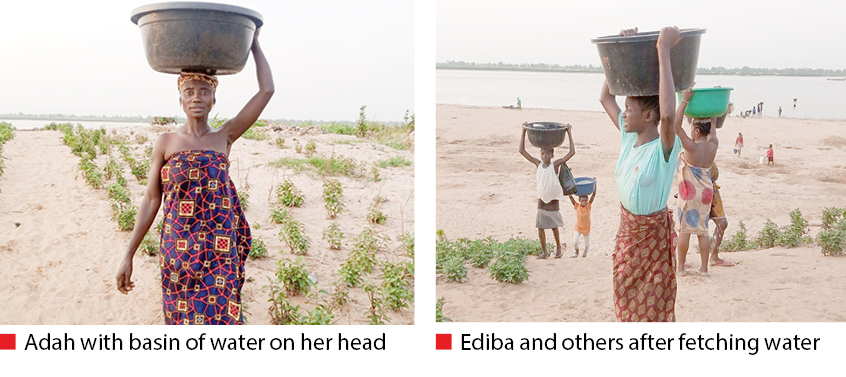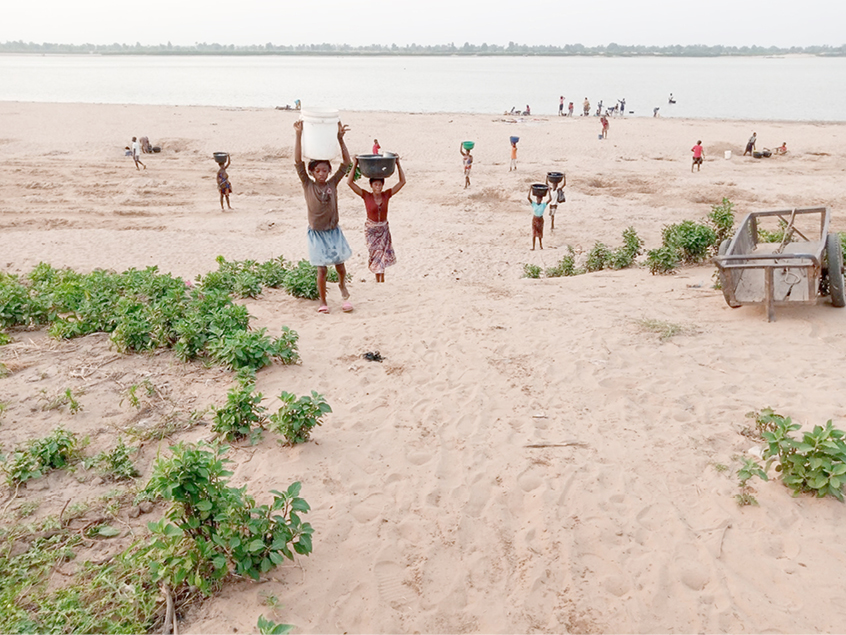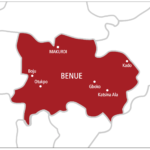Residents of Agbo community have lived without access to potable water for a long while, which has also left them vulnerable to waterborne diseases. In this Daily Trust Saturday report, residents narrate their daily struggle and frustrations in accessing water.
Felicia Adah seemed unperturbed trekking some distance from her home to the fringes of River Benue, which passes through her community, Agbo, a suburb of Makurdi, the capital of the state, to fetch water for her household needs.
The middle aged mother does such distance trekking twice daily—morning and evening; sometimes with the help of her children to get water for their use.
“It has been 50 years of doing this. It has become a normal thing. I was born in this community and I grew up to see residents trek a distance to fetch water from the river.
- Fuel subsidy: Labour begins nationwide strike Wednesday
- Speakership: North East coalition endorses Tajuddeen
“We don’t have any other source of water. Every dry season we have to dig to get drinkable water.
“Although it is tasking to walk the distance every morning and evening to fetch water from the river, I don’t complain. I am used to it now,” she told our correspondent, excitedly.
Like most women of the community, Adah has become used to struggling for water in their vicinity despite the presence of large water bodies.

One of such women, Ene Ediba, thinks that if government extends water pipeline or motorised boreholes to the community, a lot of them would be saved from health and environmental hazards.
She said they were also at the mercy of dangerous rodents and illnesses associated with the source of their drinkable water.
“Most times, members of my household suffer from typhoid, diarrhea and cholera. And I am told it is as a result of drinking bad water.
“But what can we do? We depend on this river for washing, bathing and cooking. Whenever it is dry season we move farther into the river to fetch water while we dig the bed for drinkable water,” Ediba added.
Another young woman simply identified as Kassie Tule told our correspondent that digging the riverbed for water was the best option to get potable water.
Kassie said, “Those who have money to buy sachet water depend on that as source of potable water for their families. But most people like us who are financially handicapped cannot afford a bag of sachet water, which costs between N200 and N300. And I need to buy at least four bags daily for my family of seven. That is the reason we depend on this river as our source of drinkable water.”
In the same vein, Uchena Jude, who lives with his family in Aboh-Kwaghba, an adjourning community to Agbo, lamented that water crisis remained their major challenge after armed herders threats.
Jude, a trader and farmer who has lived for five years in the community, said there was nothing to depict government’s presence as far water was concerned in that axis of the Benue State capital.
He said their only source of water during the dry season was from the river, adding that since he and his family cannot trek long distances to fetch water, he resorted to buying from vendors.
“We buy from water vendors who fetch from River Benue, which is far from my house, and my family members cannot do the trekking.
“If the government can give us mechanised boreholes or waterborne water, will be very happy,” he said.
Our correspondent reports that like Agbo, some other communities situated on Inyiongun road at the Wadata axis of Makurdi, though blessed with water bodies, do not have access to potable water, a situation that has exposed them to communicable diseases.
Dr David Alapa of the Federal Medical Centre (FMC), Makurdi, said such communities and others like them in the state were at a high risk of contracting waterborne diseases.
Consequently, the affected communities called on the state government and corporate organisations to intervene in their situation, which they said had lasted for over 70 years.
Reacting, the Benue State Government told Daily Trust on Sunday that it was working hard to resolve issues surrounding the unavailability of water in the affected areas.
The Commissioner for Water Resources and Environment, Dr Godwin Oyiwona, said the present government had done a lot to provide water for the populace.
Oyiwona said, “It is not possible to supply water everywhere in Benue State, but the state government has done much in the sector. This will soon be made known at a press conference my ministry is putting up in regard to our scorecard.
“If there are one or two challenges in the delivery of water, it is normal because another administration will come to continue from where this government will stop. Government continues.”

 Join Daily Trust WhatsApp Community For Quick Access To News and Happenings Around You.
Join Daily Trust WhatsApp Community For Quick Access To News and Happenings Around You.
